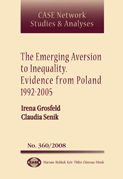The Emerging Aversion to Inequality

The topic, which focused on the changing attitudes of Polish citizens over the period of early and late transition from Communism, produced many results through intense research and analysis of data. The study proved the existence of a turning point, as established by Hirschman with regards to a relationship between satisfaction and inequality. This turning point which occurred in 1997, according to the data, is natural to occur since inequality at the start is considered to be a driving point for the less fortunate to try and better themselves. Yet, at a certain point if not much progress has been made for the average person, satisfaction will begin to fall markedly.
The study also develops three key policy implications for similar conditions, of states in transition. Dr. Grosfeld states them as follows:
Exploit rapidly the initial “window of opportunity” for reforms.
- Remember that the citizens may tolerate social strife for some years but democracy will become vulnerable unless policies address problems of inequality
- More generally: in developed economies it is important to ensure the social cohesion and make sure that the functioning of the market is perceived as fair and transparent
These three guiding principles, after the analysis of the evidence, seem to be the best roadmap for a nation trying to reform itself to a capitalist system; while at the same time making sure that the citizens are kept satisfied.
CASE would once again like to thank Dr. Grosfeld for her wonderful presentation, and her hard work in developing an academic study of a topic which not only discusses Polish society, but can prove a framework for other nations in transitory periods.
For more information click here.
To download the latest issue of " CASE Network: Studies and Analyses": click here.
